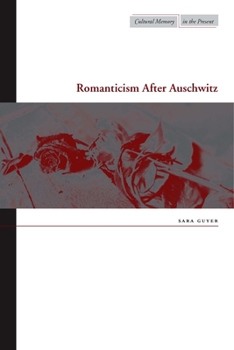Romanticism After Auschwitz
Romanticism After Auschwitz reveals how post-Holocaust testimony remains romantic, and shows why romanticism must therefore be rethought. The book argues that what literary historians have traditionally called "romanticism," and characterized as a literary movement stretching roughly between 1785 and 1832, should be redescribed in light of two circumstances. The first is the specific inadequacy of literary-historical models before "romantic"...
Format:Hardcover
Language:English
ISBN:0804755248
ISBN13:9780804755245
Release Date:August 2007
Publisher:Stanford University Press
Length:384 Pages
Weight:1.45 lbs.
Dimensions:1.0" x 6.4" x 9.0"
Customer Reviews
0 rating





